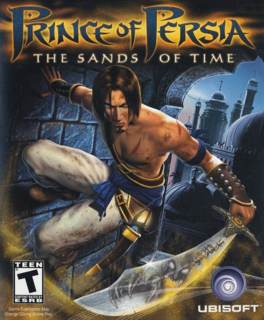I'm not a big fan of the saying that "this game was good for its time" or "it aged terribly". While it's true that gaming conventions and expectations that people have of games evolve and advance from one generation to another, a truly good game is one that will be fun 20 years down the line. If you play a game that you liked as a kid and find that it doesn't hold up, that doesn't mean the game magically got worse, it means your tastes changed, or that there were flaws with the game you didn't recognize as a kid. Keeping this in mind, and having been around for the beginning of the PS2/Gamecube era, I can honestly say I have no idea what critics saw in this game that was worthy of the accolades dumped upon it.
So what is it that people liked about this game? The story? You're a prince who gets tricked into turning your father and a bunch of other people into zombies by an evil wizard on a diplomatic trip to another country's palace. Go make your way out of the palace and take revenge. It's a simple setup with nothing unique or interesting about it. The Prince is a generic character with no discernible personality and no emotions, and is appropriately voiced by Yuri Lowenthal, whose mastery at playing bland, emotionless characters is matched only by his talent for playing loud, obnoxious teenagers who you want to punch in the face every time they open their screechy mouths.
Could it be the combat people enjoyed? Doubtful. There's little depth to it. You swing your sword until the zombies go down, and use a finisher so they don't get back up. When they block your attacks, you can vault over them and deliver a backblow that instantly knocks them down, which you'll quickly learn is the best way to conduct combat. Multidirectional combat is not well executed due to the lack of a lock-on function, and the time-stopping powers that you can utilize mid-combat are useless, since the aforementioned vaulting attack is faster and more effective. In any given fight zombies will keep popping up until the game decides it's done for the moment, which makes it feel more like a chore than anything.
But what is Prince of Persia if not a platforming game? The platforming must be where it's at, right? Well, yes and no. The platforming is functional, certainly. The camera controls are annoying and imperfect, but nothing you can't work around. The movement controls have some annoying quirks, but not of the sort that will lead to cheap deaths. You do a lot of climbing, jumping, wallrunning, and dodging traps. I mean a LOT of it. In fact, that's the bulk of the game: run through an obstacle course to get to the next one, occasionally stopping for terrible combat. You can also use your magic dagger to reverse time, which sounds like a cool idea plotwise, but in practice just means you get a few retries if you miss a jump; in other words, a major gameplay mechanic that could have just as easily been removed by starting you where you were when you die. Or to put it in more practical terms, it's like using save states off an emulator, except with significantly less utility.
So here's the main problem: In a platforming game, obstacle courses should be a means to an end, not the end in and of itself. In the Rareware platformers of the N64 era, you get past obstacles to collect items needed for your quest to continue. In Ratchet and Clank, you traverse obstacle courses to get to the next area, where you might have to fight enemies (in a way that's actually enjoyable), play a minigame, or reach the next part of the story. In this game, you finish a whole series of obstacles to move on to the next one. No good combat to look forward to, no gripping story to reward you for continuing, no clear goal or destination except the next obstacle course. If you're going to make a game about nothing but platforming, you should keep the action moving at a very brisk pace, so at least players can get their adrenaline flowing while they navigate all the tricky obstacles. Having a series of obstacles that take a long time to navigate and interspersing it with annoying (not difficult, just annoying) puzzles and tedious combat for 10 hours straight does not make for an exciting game. So what am I missing, game critics of the early 2000's?

